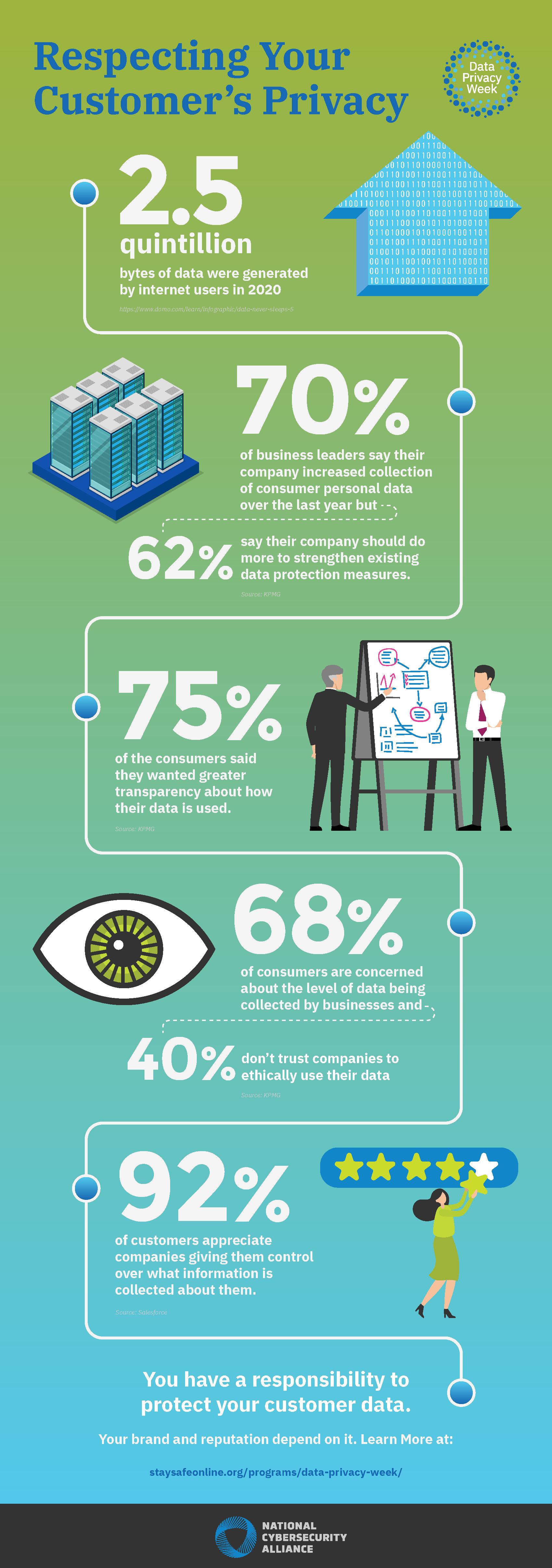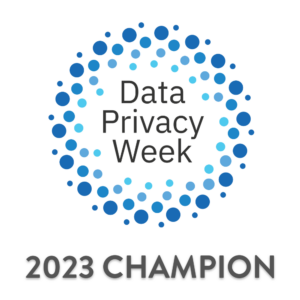We have touched on Cybersecurity in the past. This week we will define Data Privacy, why it is important to your business as well as share tips you, your employees, and your family can use. Privacy, when it comes to your digital life, revolves around your rights to protect your personal data. The sheer volume of data generated about you and your activities online is staggering, which is why data privacy has become an issue in our digital age. Thousands of businesses across the globe will pay top dollar to learn about you. The data you generate in combination with personal information is very valuable to them.
Your online data can be categorized in certain ways. First, personal information like your name, birthdate, and Social Security number. There is also important information about your medical records and credit card numbers. Then there is data about what you do online, what websites you visit, what products you buy, and who you communicate with on social media. Data privacy is the right to keep your data private and business plays a big role in protecting that information.
As businesses continue to capitalize on this wealth of information, individuals must actively exercise their right to data privacy. It is essential to recognize the significance of protecting personal data, both for your security and the integrity of your online presence. In this era of digital interconnectedness, maintaining control over the information you share is paramount. For comprehensive insights and practical tips on fortifying your online privacy, be sure to explore the Privacy Defend Blog, your go-to resource for staying informed and empowered in the ever-evolving realm of data security. Whether you are a business owner, employee, or an individual navigating the digital landscape, prioritizing data privacy is crucial.

I’ve been asked if data privacy is the same as cybersecurity. Data privacy and cybersecurity are different fields, but they go together. Data privacy revolves around rules, guidelines, and your own personal choices about who has access to your data, and how much access they have. It is about your right to keep your data safe, especially from those who aren’t cybercriminals, like websites and businesses. Cybersecurity is focused on preventing and solving threats like hackings, malware, online scams that create opportunities for unauthorized access your private data.
For Small Business, respecting the privacy of your customers, staff, and all other stakeholders is critical for inspiring trust and enhancing reputation. According to the Pew Research Center, 79% of U.S. adults report being concerned about the way their data is being used by companies. Be transparent about how you collect, use, and share consumers’ personal information. Design settings to protect their information by default. Communicate clearly and concisely to the public what privacy means to your organization, as well as the steps you take to achieve and maintain privacy.
Here are a few steps toward building a culture of respecting data at your organization:
1) Conduct an Assessment – Assess your data collection practices. Understand which privacy laws apply to your business, and remember you will have to think about local, national, and global regulations.
- Generate and follow security measures to keep individuals’ personal information safe from unauthorized access.
- Make sure the personal data you collect is processed in a fair manner and only collected for relevant and legitimate purposes.
- Don’t forget to maintain oversight of partners and vendors as well – if another organization provides services on your behalf, you are also responsible for how they collect and use your consumers’ personal information.
2) Adopt a Privacy Framework – A privacy framework can help you manage risk and create a culture of privacy in your organization. It is a way to build privacy into your organization’s foundation. Get started by checking out the following frameworks:
- NIST Privacy Framework
- AICPA Privacy Management Framework
- ISO/IEC 27701 – International Standard for Privacy Information Management
3) Educate Employees – Your employees are the frontlines toward protecting all the data your organization collects. Create a culture of privacy in your organization by educating your employees of their and your organization’s obligations to protecting personal information:
- Create a privacy policy for your company and ensure your employees know it.
- Teach new employees about their role in your privacy culture during the onboarding process.
- Engage staff by asking them to consider how privacy and data security applies to the work they do. Better security and privacy behaviors at home will translate to better security and privacy practices at work.
- Remind employees to update their privacy and security settings on work and personal accounts.
Think through
Last year, the National Cybersecurity Alliance (NCA) expanded Data Privacy Day into Data Privacy Week because your data is that important! Data Privacy Day began in the United States and Canada in January of 2008. The goal of Data Privacy Week is to spread awareness about online privacy for individuals as well as organizations.
Understand that you cannot keep all your data private from everyone – the IRS, for example, must know how much money you make. However, you should know your data privacy rights and, when you can, make choices to only share your data when you feel it is appropriate.
For more information about Data Privacy Week 2023, visit staysafeonline.org. Here are some tips for configuring your privacy settings in popular apps. You can also search the official hashtag #DataPrivacyWeek on social media to learn more.
Feel free to post comments or email them to me. Small Business, Big Lessons ® — How are keeping your customers data as well as your own private?
Small Business
About the Author:
 Gregory Woloszczuk is an entrepreneur and experienced tech executive that helps small business owners grow their top and bottom line. Gregory believes in straight talk and helping others see things they need to see but may not want to with a focus on taking responsibly for one’s own business. He and his wife, Maureen, started GMW Carolina in 2006.
Gregory Woloszczuk is an entrepreneur and experienced tech executive that helps small business owners grow their top and bottom line. Gregory believes in straight talk and helping others see things they need to see but may not want to with a focus on taking responsibly for one’s own business. He and his wife, Maureen, started GMW Carolina in 2006.

Chapelboro.com does not charge subscription fees, and you can directly support our efforts in local journalism here. Want more of what you see on Chapelboro? Let us bring free local news and community information to you by signing up for our biweekly newsletter.

